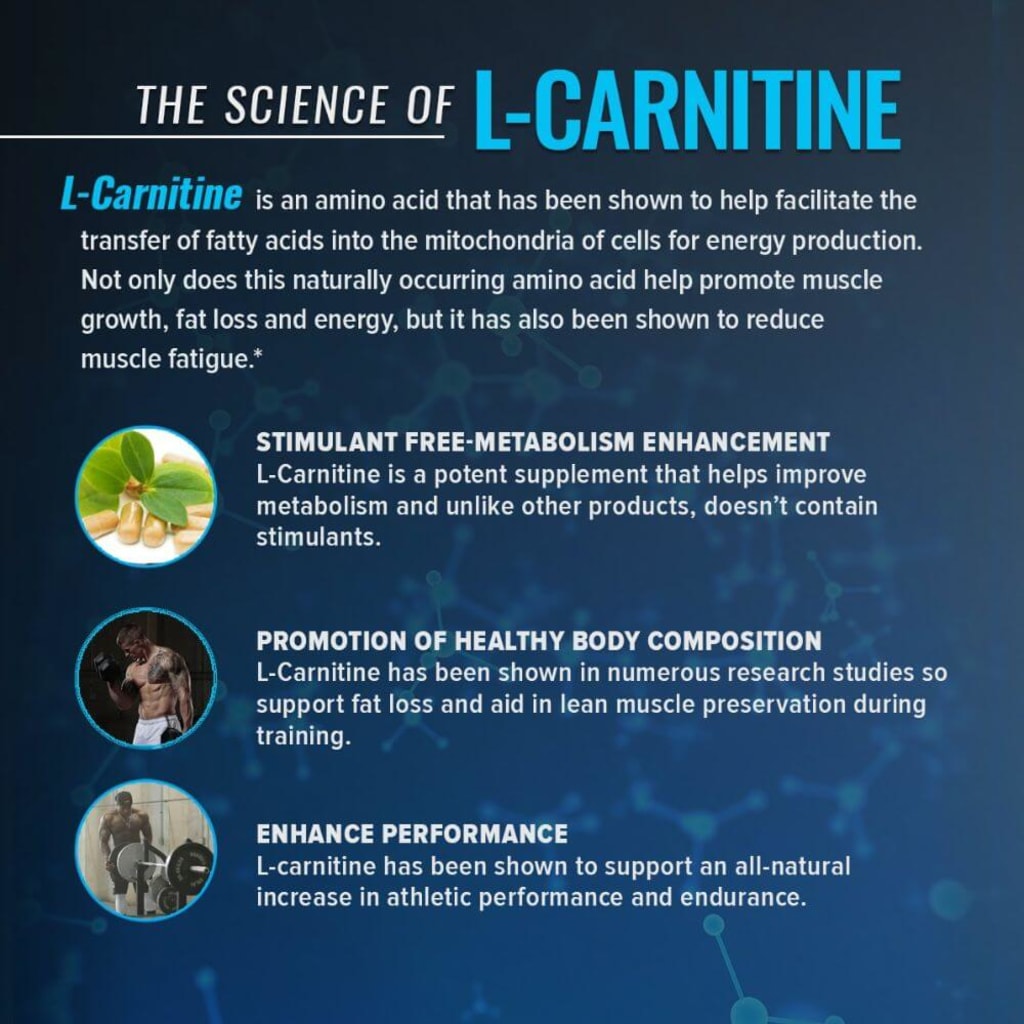L-carnitine for metabolism
L-carnitine is believed to play a role in fat metabolism and energy production

L-carnitine for Metabolism
L-carnitine is a naturally occurring amino acid derivative that is involved in energy metabolism in the body. It is synthesized in the liver and kidneys from the amino acids lysine and methionine, and it is also found in some foods, particularly red meat and dairy products.
L-carnitine plays a key role in the transportation of fatty acids into the mitochondria, the energy-producing structures within cells, where they can be oxidized to generate energy. As such, L-carnitine is believed to play a role in fat metabolism and energy production, and it has been used as a dietary supplement to enhance exercise performance and support weight loss.
While some studies have suggested that L-carnitine supplementation may be beneficial for these purposes, the evidence is mixed, and more research is needed to fully understand its effects. Additionally, high doses of L-carnitine have been associated with certain side effects, such as gastrointestinal discomfort and an increased risk of seizures in people with epilepsy.
Overall, L-carnitine is a naturally occurring compound that plays an important role in energy metabolism in the body, but its use as a dietary supplement should be approached with caution and under the guidance of a healthcare professional.
Functions of L-carnitine:
Aside from its role in energy metabolism, L-carnitine has been studied for its potential benefits in various health conditions. It has been suggested to have antioxidant properties, improve insulin sensitivity, and support cardiovascular health. Some studies have also found that L-carnitine may help reduce symptoms of certain medical conditions such as peripheral artery disease, heart failure, and chronic fatigue syndrome.
Sources of L-carnitine:
L-carnitine can be found naturally in animal-based products such as meat, poultry, fish, and dairy. The amount of L-carnitine in these foods varies depending on the type of food and how it is cooked. For example, red meat contains more L-carnitine than chicken, and cooking methods that involve high temperatures may reduce the amount of L-carnitine in the food.
Supplementation of L-carnitine:
L-carnitine is available as a dietary supplement in various forms, including capsules, tablets, and liquid. It is often marketed as a weight loss supplement or as a performance enhancer for athletes. However, the evidence supporting these claims is limited and inconsistent.
Dosage of L-carnitine:
The appropriate dosage of L-carnitine depends on the individual's age, health status, and reasons for taking the supplement. As with any dietary supplement, it is important to follow the recommended dosage and to talk to a healthcare provider before starting L-carnitine supplementation.
Side Effects of L-carnitine:
L-carnitine is generally considered safe when taken in recommended dosages. However, high doses may cause side effects such as gastrointestinal discomfort, nausea, vomiting, diarrhea, and a fishy odor in urine, breath, and sweat. Additionally, people with certain health conditions, such as kidney disease or epilepsy, should avoid L-carnitine supplements or use them only under the guidance of a healthcare provider.
Forms:
L-carnitine is available in different forms, including L-carnitine tartrate, acetyl-L-carnitine, and propionyl-L-carnitine. Each form has slightly different properties and is used for different purposes. For example, L-carnitine tartrate is often used to support athletic performance, while acetyl-L-carnitine is believed to have cognitive benefits.
Absorption:
The absorption of L-carnitine can be influenced by various factors, such as the dose, the form of the supplement, and the presence of other nutrients in the diet. Some research suggests that taking L-carnitine supplements with carbohydrates may enhance its absorption.
Interactions:
L-carnitine may interact with certain medications, such as blood thinners, thyroid hormones, and anticonvulsants. It may also interact with supplements such as creatine, which is often used by athletes. It is important to talk to a healthcare provider before taking L-carnitine supplements if you are taking any medications or other dietary supplements.
Deficiency:
L-carnitine deficiency is rare and is usually caused by genetic disorders or certain medical conditions that affect the absorption or synthesis of L-carnitine. Symptoms of L-carnitine deficiency may include muscle weakness, fatigue, and heart problems.
Conclusion:
While L-carnitine has been studied for its potential benefits, the evidence is mixed, and more research is needed to fully understand its effects. It is important to talk to a healthcare provider before taking L-carnitine supplements, especially if you have any medical conditions or are taking any medications. L-carnitine can be obtained through a balanced diet that includes animal-based products, but supplementation may be beneficial in certain circumstances.
About the Creator
Kaushik Manavadariya
I am the CEO & Founder of PreDoc - India and 3G Tech Solutions. I am loving to do coding myself to create innovative cloud-based products.





Comments
There are no comments for this story
Be the first to respond and start the conversation.